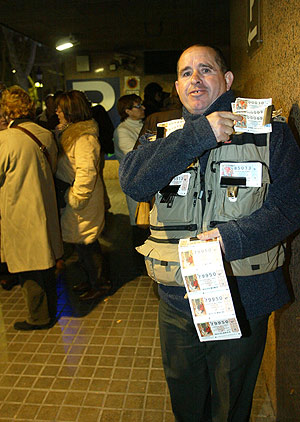
It would be nice if I had more time to comment on some of my recent reading. Over the Christmas holidays, in addition to the Richard Price novel
Bloodbrothers, I read Gabriel García Márquez's short novel,
Memoria de mis putas tristes. (It was translated to English by Edith Grossman with the title
Memories of my melancholy whores.) Garcia Marquez writes beautifully, but the story didn't say much to me. An old man who has just turned ninety decides he wants a virgin before he dies, so his old friend the local
madame sets him up with a fourteen year old girl. His initial desire is thwarted but he ends up falling in love with the girl. I've also been reading Luis Garcia Montero's most recent essay,
Inquietudes bárbaras, and Paco Ruiz Noguera's just published collection of poems,
Arquitectura efímera. Paco's book has been a real pleasant surprise. There is a definite change in tone and style with his earlier work; the language is simpler, more direct. I owe him a note.
Bloodbrothers was good, the first novel I had read by Richard Price. It's rigid determinism reminded me of Zola. The Garcia Montero essay is rather frustrating, heavy on argumentation, but sparse with examples that might give some weight to his line of thought. Maybe I'll come back to that another day, but right now I want to jot down a few notes on yesterday's little excursion to Comares, a very small village up in the Axarquia, the eastern most part of the province that includes some coastal towns and mountain villages that are at altitudes of over 3,000 feet in spite of their very close proximity to the sea. Yesterday Comares was
de fiesta, celebrating their patron saint, St. Hilarion of Poitiers. Odd for this little village to have a fourth century French bishop as their main man, and I don't know how that came to be. In any case, our little group was welcomed by the mayor himself and his wife just before the mass that would be followed by the procession of Hilarion down to the square and then back to the church. I hadn't been in a church for a service in a long time and I guess I was reminded why: the priest very earnestly explained to the faithful that our current economic mess was completely due to the fact that we had turned away from God. Oh well, people didn't seem bothered, they were just waiting for the procession. So
Hilario was marched down the very narrow street to the plaza where the ten or twelve men carrying the
throne were served beer by... the mayor himself. (This guy was everywhere, and with his amazing toupée was easy to spot!) Then it was back to the church for the saint. And an open bar for the two thousand or so people in attendance. Yes, it was all on the house, or should I say, on town hall. All the beer and wine you could want. At 4 pm the soft drinks and water were all gone, but the beer and wine was still flowing. And there was plenty of free food, too: chorizo (served by, yes... the mayor himself!), blood sausage, wonderful olives, and, of course, paella for everyone! The serving of all this food and drink was appropriately chaotic, but the students who were stoic enough to wait in line very kindly brought me a plate of paella. And it was actually quite good. And of course, music: two or three
pandas de verdiales, a good
banda de charangas, and finally the "orquesta", consisting of a female vocalist and two men with those computerized keyboards that produce whatever you want, in this case, mainly a very heavy bass thumpa, thumpa, thumpa. I'm not exactly sure why, but I had this sensation that the leader of the group was on a weekend furlough from the provincial prison. Then shortly before five pm we had a truly
esperpéntico moment: the band was ordered to stop the music. A funeral procession. Right through the square they marched, even breaking the line of the people still waiting for paella. The lack of solemnity, of respect for that family's drama, was, for me, observing from a distance, while not surprising, nonetheless rather stunning. Well, it was a beautiful, sunny day and I'm sure a memorable experience for the five students who joined us.
 Yesterday I was catching up with José Angel Cilleruelo's blog and came across one of his funny little dialogues. I don't know if this is pure invention, but I doubt it; I can imagine this happening pretty much the way he presents it. He presents it under the category "little theatre works." The conversation is between a lottery seller and client, which is immediately obvious for a reader of the original, but not necessarily so for one unfamiliar with Spanish life. Something about it caught my fancy so I went ahead and translated it:
Yesterday I was catching up with José Angel Cilleruelo's blog and came across one of his funny little dialogues. I don't know if this is pure invention, but I doubt it; I can imagine this happening pretty much the way he presents it. He presents it under the category "little theatre works." The conversation is between a lottery seller and client, which is immediately obvious for a reader of the original, but not necessarily so for one unfamiliar with Spanish life. Something about it caught my fancy so I went ahead and translated it:


















.jpg)


